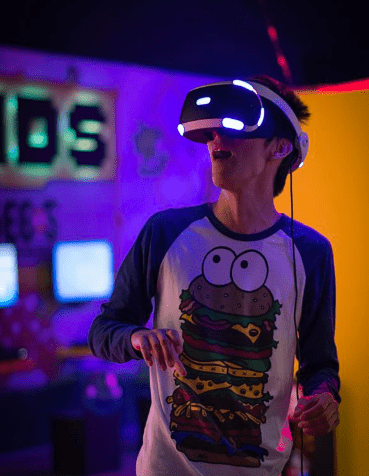Over the last ten years, video games have steadily etched their way into one of the most preferred form of entertainment throughout the world as a result of the steady decrease in TV viewing habits. This is because video games are no longer limited to arcades or homes. Portable systems and mobile devices have made gaming a possibility no matter where you are. Nonetheless, consoles and computers remain widely popular gaming systems.
The Growing Concern of Gaming Addiction in Children
This ubiquitous nature of video games is the main cause of video gaming addiction in teens and children as they do not know when they should stop playing. Not surprisingly, parents are becoming increasingly concerned about this screen addiction. It is a major cause of worry when you notice that video games are the top priority in your child’s life. The child may start neglecting their hobbies, friends, sports, and schoolwork. Moreover, they may lash out at anyone who tries to limit their gaming.
The American Academy of Pediatrics has it that, on average, kids today spend about seven hours each day on some type of electronic device. Additionally, about 97% of kids aged between 12 and 17 play video games regularly.
Understandably, as a parent, you may start wondering whether your child has an actual addiction to video games. And if so, is their brain in danger? This article will take a closer look at video game addiction and how it can affect your child’s brain and life?
What Is Gaming Addiction?
Gaming addiction refers to the compulsive and uncontrolled use of digital games causing life problems. It is therefore considered a form of tech addiction or screen addiction by experts. Video gaming addiction is an issue of increasing concern among parents as games become popular. Digital games are increasingly being targeted at children across multiple platforms and devices today. These include console games, computer games, cell phone games, and arcade games for young players. Today, they are even embedded in social networking sites to reach more young users.
How Video Games Trigger the Brain’s Survival Response
Most games are designed to trigger the sensory responses that humans use when they are exposed to danger. Whenever the brain feels threatened or senses danger, it kicks in our primitive survival mechanisms that work to protect us from harm. This is an instantaneous response that has been hardwired into our genes to ensure our survival. Nonetheless, a threat does not have to be real for this response to be triggered. It only takes the brain to perceive danger for the body to react.
Upon triggering this instinct, the nervous system and hormones work to jolt our state of arousal to enable faster reactions. As such, the body goes into a state of hyperarousal – commonly referred to as the fight-or-flight response. The issue, however, is that the feelings associated with this state are typically difficult to shake off even after the threat (real or perceived) is long gone.
The hyperarousal state is also referred to as ‘running from the tiger’ for good reason. Our ancestors literally had to protect themselves from predators by either fighting or running away. Even though most humans today do not live in fear of predation, we still need this response. This rapid stress response helps us in emergency situations and with mild day-to-day stress reactions. However, repeatedly going through this response when survival is not at stake does more harm than good.
From Hyperarousal to Chronic Stress
As mentioned earlier, after a fight or flight stress response, the brain usually has a hard time regulating itself to a calm state. As such, when this response occurs regularly or too intensely, it can lead to a state of chronic stress. Stress is usually as a result of the mismatch between the survival response reactions and energy expenditure, as is typical with video games. When your body goes into that response, it builds up energy to help you through that moment. As such, this energy needs to be physically discharged so that the nervous system can re-regulate. When that energy is not discharged, the nervous system does not re-regulate effectively thus leading to chronic stress.
Once the body goes into a state of chronic stress, blood flow is directed away from the frontal lobe (the higher thinking part of the brain) and towards the deeper, primitive areas which are designed to help you survive adverse situations. The result is a functioning impairment.
Chronic stress sets in faster in children than in adults. This is because their nervous systems are still developing thus making those sequence of events to occur a lot faster in them. And when a child becomes chronically stressed, they soon begin to struggle.

And because the primary effect of chronic stress is felt on the frontal lobe, the child becomes mentally depleted. This leads to issues such as having trouble paying attention, suppressed impulses,an inability to manage emotions, difficulty following directions, frustration, and a hard time executing tasks. Moreover, these effects are compounded by the amount of screen-time that is spent playing these games. The body clock of a heavy gamer is usually distorted thus hindering deep sleep. Missing quality sleep regularly will result in mood, cognitive, and behavior issues.
Warning Signs of Video Game Addiction
An addiction to video games is similar to other addictions in terms of the amount of time and effort channeled into the activity, the emotional attachment involved, and the patterns of social difficulties displayed by the gamers.
As is the case with other addictions, video game addicts are preoccupied with gaming, thus disrupting their relationships, hobbies, and school. The younger a child begins to play video games, the more the likelihood that they will develop a dependence on video games.

Additional Harmful Effects of Excessive Gaming
In addition to addiction, the following are other harmful effects that have been linked to heavy video game use:
Research on video game addicts reveals they generally exhibit poorer mental health and decreased cognitive abilities. They demonstrate poor impulse control and ADHD symptoms as common characteristics of their gaming addiction. Individuals addicted to video games tend to experience emotional difficulties and heightened susceptibility to anxiety. They also report feeling socially isolated and are more likely to have issues with internet pornography.
Parents need to learn how video game time overstimulates the nervous system in their children. Understanding these effects helps parents make strategic decisions about video games in their children’s lives. This knowledge puts parents in the driver’s seat rather than being swayed by misleading headlines. Parents can make informed choices instead of reacting to cultural pressures and conflicting media messages.

Unfortunately, gaming addiction is a relatively new psychological problem, and as such, it can be difficult for parents to find experts who specialize in video game addiction. Nonetheless, help is available for parents looking to help their kids to overcome their tech addiction. Omega Recovery is a contemporary addiction treatment center run by experts with a breadth of knowledge across all areas of addiction. Are you looking to curb your child’s gaming addiction? Contact us today, and we will be glad to help.







